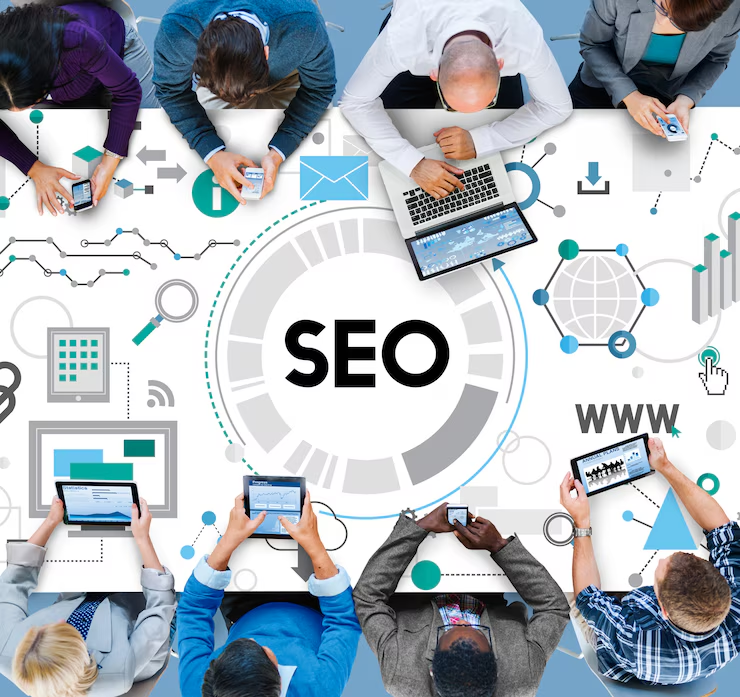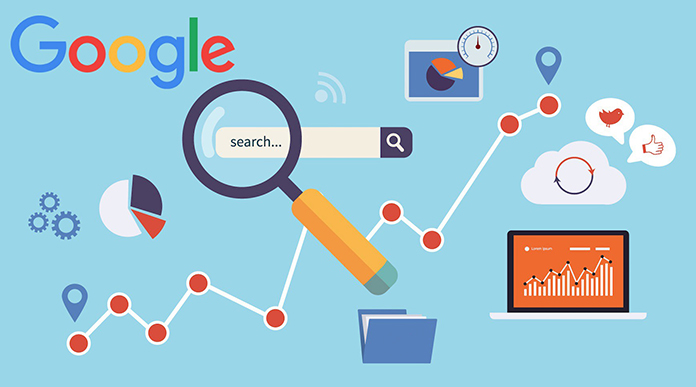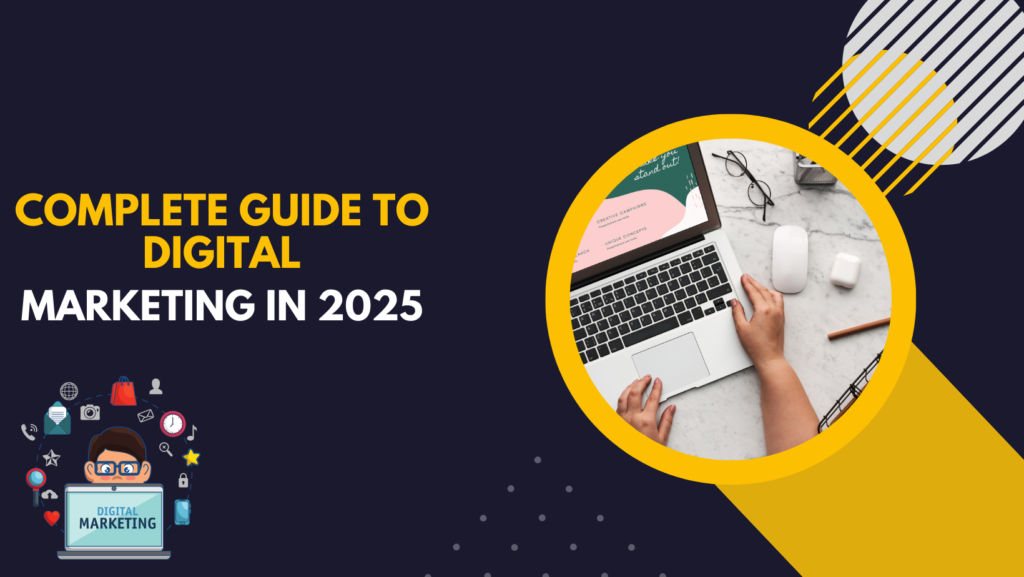In the digital age, Artificial Intelligence (AI) has revolutionized various industries, and Search Engine Optimization (SEO) is no exception. As search engines evolve to deliver more accurate and relevant search results, businesses must adapt their SEO strategies to align with AI-driven algorithms. This guide explores the impact of AI on SEO, best practices for leveraging AI tools, and how businesses can stay ahead in the AI-powered search landscape.
1. Understanding AI in SEO
AI is a branch of computer science that enables machines to perform tasks that typically require human intelligence, such as learning, reasoning, and problem-solving. In the context of SEO, AI plays a crucial role in:
- Understanding search intent
- Analyzing user behavior
- Automating keyword research
- Enhancing content optimization
- Personalizing search results
Search engines like Google use AI-driven algorithms such as RankBrain, BERT, and MUM to deliver more relevant search results. These algorithms continuously learn from user interactions, making SEO a dynamic and evolving process.
2. How AI is Changing SEO
2.1. AI-Powered Search Algorithms
Google’s AI-powered algorithms have significantly changed the way search rankings work:
- RankBrain (2015): A machine learning algorithm that helps Google understand search queries better, especially ambiguous ones.
- BERT (2019): Focuses on understanding the context of words in a search query, improving natural language processing (NLP).
- MUM (2021): A more advanced AI model that understands multiple formats (text, image, video) and languages to provide richer search results.
To rank well in AI-driven search, websites need high-quality, relevant, and engaging content.
2.2. AI and Keyword Research
Traditional keyword research involves finding high-volume search terms. However, AI-driven tools like Ahrefs, SEMrush, and Google Keyword Planner analyze user intent, search patterns, and semantic variations to suggest better keywords.
Instead of focusing only on exact-match keywords, AI encourages a shift toward topic-based SEO, where related keywords and synonyms enhance content relevance.
2.3. AI and Content Optimization
AI tools like Surfer SEO, Clearscope, and Frase analyze top-ranking pages to recommend:
- Ideal content length
- Keyword placement
- Readability improvements
- Content gaps and opportunities
These tools help content creators write more optimized and AI-friendly content that matches user intent.
2.4. AI and Voice Search Optimization
With the rise of voice assistants like Google Assistant, Alexa, and Siri, optimizing for voice search is crucial. AI processes natural language queries differently from text searches.
How to optimize for voice search:
- Use long-tail keywords and conversational phrases.
- Structure content with FAQ sections for direct answers.
- Improve page speed and mobile-friendliness.
Voice search continues to grow, making AI-driven optimization essential for SEO success.
2.5. AI and User Experience (UX)
Google prioritizes websites that offer a great user experience. AI evaluates UX metrics like:
- Dwell time (how long a user stays on a page)
- Bounce rate (percentage of visitors who leave quickly)
- Core Web Vitals (page speed, interactivity, and visual stability)
Using AI-driven analytics tools like Google Analytics, Hotjar, and Crazy Egg, businesses can monitor and enhance their website’s UX.
3. AI Tools for SEO
Several AI-powered SEO tools can help businesses improve their rankings and streamline their strategies.
3.1. AI for Keyword Research
- SEMrush: Provides keyword insights, difficulty scores, and search trends.
- Ahrefs: Analyzes competitor keywords and backlink strategies.
- Ubersuggest: Offers keyword suggestions and content ideas.
3.2. AI for Content Creation and Optimization
- Frase.io: Suggests content improvements based on competitors.
- Surfer SEO: Analyzes keyword density and on-page factors.
- Jasper AI (formerly Jarvis): Generates AI-powered content drafts.
3.3. AI for Technical SEO
- Screaming Frog: Crawls websites to detect SEO issues.
- Google Search Console: Monitors indexing and search performance.
- PageSpeed Insights: Provides speed optimization recommendations.
Using these tools can automate repetitive SEO tasks and enhance efficiency.
4. Best Practices for AI-Driven SEO
4.1. Focus on Search Intent
Google’s AI algorithms prioritize content that aligns with user intent rather than just keywords. Content should:
- Address informational, navigational, transactional, or commercial intent.
- Provide comprehensive and actionable solutions to users’ queries.
4.2. Write High-Quality, Engaging Content
AI-driven SEO values original, informative, and well-structured content. Follow these guidelines:
- Use clear headings (H1, H2, H3) for better readability.
- Incorporate multimedia elements (images, videos) to engage users.
- Keep content concise and valuable to retain user attention.
4.3. Optimize for Mobile and Page Speed
AI ranks mobile-friendly websites higher. Optimize by:
- Using responsive design to fit all screen sizes.
- Compressing images and reducing unnecessary scripts.
- Enabling lazy loading for faster page speeds.
4.4. Implement AI Chatbots for Better Engagement
AI-powered chatbots improve user engagement and retention. They can:
- Answer customer queries in real-time.
- Provide personalized recommendations.
- Reduce bounce rates by keeping users engaged.
4.5. Build AI-Driven Backlink Strategies
AI can analyze backlink quality and suggest authoritative websites for link-building. Use:
- Moz Link Explorer to check domain authority.
- BuzzSumo to find trending content for backlink opportunities.
- HARO (Help a Reporter Out) to earn high-quality media backlinks.
5. Future of AI in SEO
AI is continuously evolving, and its impact on SEO will grow. Future trends include:
- AI-generated content: More businesses will use AI tools for content creation, requiring human editing to maintain originality.
- Hyper-personalized search results: Google will focus on individual user behavior to deliver more personalized search results.
- AI-powered video SEO: Search engines will better understand and rank video content using AI-driven transcription and analysis.
- Predictive SEO: AI will analyze search trends to predict future ranking opportunities.
Businesses that adapt to AI-driven SEO strategies will stay ahead of competitors and maintain strong online visibility.
Conclusion
AI is transforming SEO by making search engines smarter and more user-focused. To succeed in AI-driven search rankings, businesses must:
✅ Understand AI-powered search algorithms.
✅ Optimize content for AI-driven user intent.
✅ Use AI tools for keyword research and content creation.
✅ Enhance website UX and mobile responsiveness.
✅ Build AI-driven backlink strategies.
By integrating AI into your SEO strategy, you can improve search rankings, attract more traffic, and future-proof your digital presence. As AI technology advances, staying updated with the latest trends and best practices will be key to long-term SEO success.
Would you like assistance in implementing AI tools for your SEO strategy? Let’s optimize your website for the future of search! 🚀


